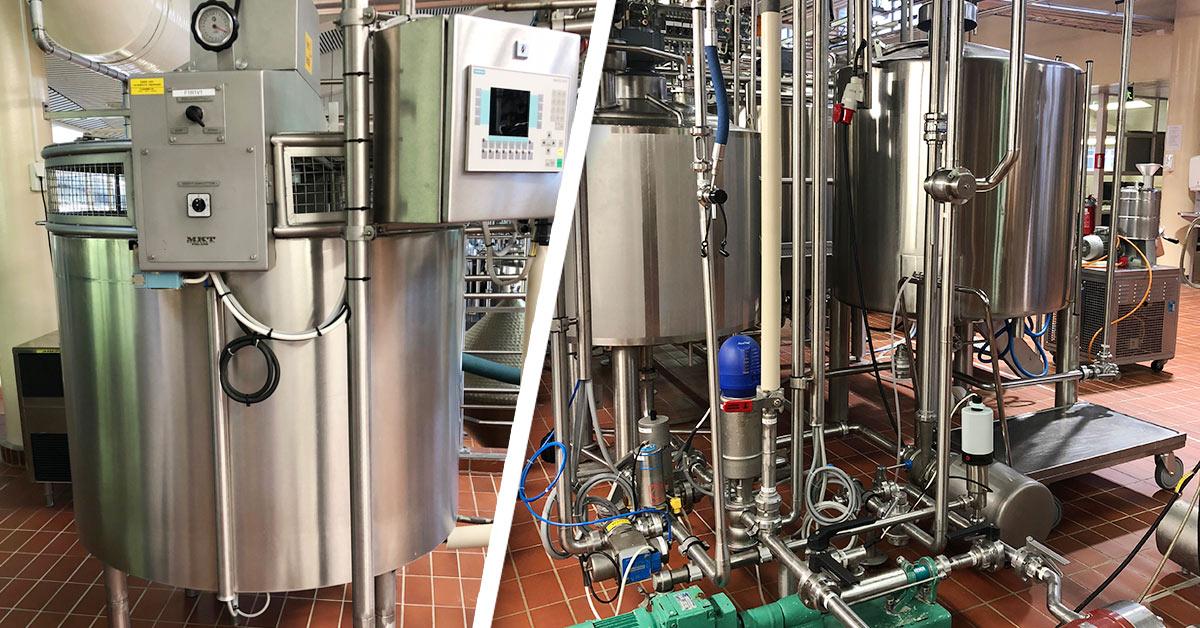A functional dairy combines expertise with new technologies
Dairy production processes have advanced far – perhaps furthest in the entire food industry. Understanding, controlling and optimizing complex processes requires functioning technology and equipment, skillful dairymen, dairy engineers and others with professional qualifications within the dairy industry. In order to achieve the best co-operation between technology and people, there is a need for understanding the user experience and the different types of needs in the field of equipment development. On the other hand, those who are responsible for processes must also be able to make the best use of the equipment they are using.
This is why we decided to interview representatives from the Dairy Production department of our collaboration partner Häme Vocational Institute to find out how the dairy industry’s competence requirements are reflected in the training of future professionals, and how one gets familiar with the equipment.
The industry sets the competence requirements
The Häme Vocational Institute Dairy Production department is the only place in Finland where it is possible to complete a basic vocational degree in Dairy Production. Besides the basic degree, it is also possible to complete a degree in dairy engineering at the same premises. A total of approximately 40–45 dairy students start the program each year. The basic degree takes two or three years to complete, most of which is spent in on-the-job learning within the industry. The Dairy Production education unit also has its own educational dairy that even has some MKT equipment.
“Our study program was originally created and funded by Finnish dairies. From the beginning, the objective has been to educate skilled professionals for the dairies. For this reason, we collaborate closely with the industry and listen to their needs,” explains Jari Latva-Koivisto, Head of the study program.
“Our students are employed by a variety of dairies, for example in fresh dairies and cheese dairies. We focus mainly on the production of different dairy products and the related process knowledge—including cheese making processes,” adds Pekka Puputti, technical advisor and teacher in the study program.

The Dairy Production education unit has its own educational dairy.
Changes in the dairy and cheese industry affect the industry’s education
As the dairy industry education collaborates closely with industry operators, the industry is constantly providing information of changes and new know how areas that should be considered in the education.
“It is extremely important to gather vast expertise already during your studies, as later, when you are already working, dairymen must be able to manage the manufacturing of even large production batches,” Latva-Koivisto explains.
Even though the Häme Vocational Institute’s Dairy Production program aims to respond to changes in the industry already during classes and in the educational dairy, however, at school things can only be taught to a certain point. For this reason, the long on-the-job training periods included in the program are often the phases where future professionals get to acquire the most up-to-date information and skills directly from the dairy industry.
Recently, in the processing industry, as in other industries, there has increasingly been talk about technological innovations, such the application of robotics. However, Latva-Koivisto and Puputti assert that despite the technological developments, dairy professionals will still need strong basic knowledge of the basic processes even in the future. As one example, they name the automated processing lines used by the cheese dairies.
“In theory, it could be anyone sitting in the control room pressing a button. However, we think it is important to educate professionals who understand what is actually happening beyond automation – why something is done and how different matters can affect the result of the process,” Puputti and Latva-Koivisto emphasize.
MKT Dairy is investing in educational collaboration
In addition to collaborating with dairies, Head of the study program Jari Latva-Koivisto also underlines the significance of collaboration with equipment partners.
“Collaboration with equipment partners is extremely important for us. Our plan is that in the future, we could utilize MKT’s expertise, for example, through guest lectures. In return, we could become involved in their equipment development.”
The MKT Dairy shares the view on the importance of collaboration, and a green light is being shown for deepening the collaboration.
“It’s vital that we, as an equipment manufacturer, engage in close collaboration with educational institutes. The Häme Vocational Institute Dairy Production program is an interesting partner and we definitely want to continue collaborating with them – for example, by providing new equipment prototypes,” envisions Petri Kalliokoski, CEO of MKT Dairy.
Additional information
Häme Vocational Institute Dairy Production (in Finnish)
Milk Works student recruitment website (in Finnish)
